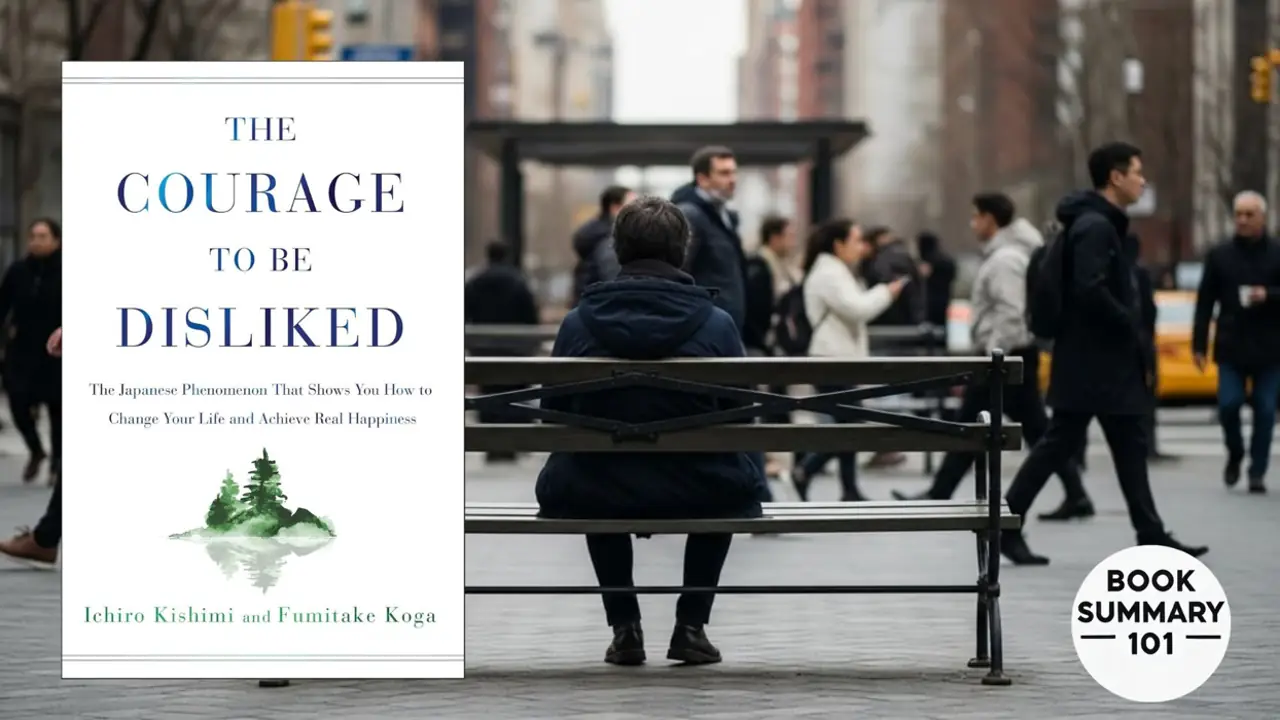Hey there! Have you ever felt trapped by the weight of other people’s opinions? Or maybe you’ve caught yourself living to please everyone but yourself? Well, you’re not alone. We all carry that inner desire to be accepted, liked, and loved—sometimes at the expense of our own happiness. But what if I told you there was a way to break free from this cycle and live authentically? The Courage to Be Disliked by Ichiro Kishimi could be your ticket to transforming your mindset and your life.
What’s The Courage to Be Disliked All About?
This book isn’t your typical self-help manual filled with generic advice. Instead, it takes the form of a dialogue between a philosopher and a young man. Through their conversations, we get to explore the profound teachings of Alfred Adler, a pioneering psychologist who focused on individual psychology. The book revolves around the central theme of self-acceptance and the freedom that comes from rejecting the need for external validation.
At the heart of the book is this idea: You are not bound by your past, you can choose your own future, and the key to happiness lies in taking responsibility for your own life. It’s a call to stop living according to other people’s expectations and to begin living according to your own values and desires.
What This Book Taught Me About True Freedom
1. The Power of Choice
In The Courage to Be Disliked, one of the most freeing ideas is that our past does not determine our future. Adlerian psychology argues that we are not limited by the events, traumas, or mistakes of our past unless we allow them to shape our mindset. Many people believe that their personalities, tendencies, or weaknesses are “fixed” because of things they’ve experienced. But according to the book, it’s not these experiences themselves but rather our interpretation of them that holds the true power.
Imagine you had a difficult childhood where you felt unloved or unappreciated. It’s easy to carry that experience into adulthood, using it to justify behaviors like mistrust, anger, or self-doubt. But as the book shows us, we can choose to look at that past differently. Instead of seeing yourself as “damaged” or “limited,” you might reframe those experiences as opportunities for growth and resilience. This doesn’t mean ignoring the pain of the past but rather realizing you have the freedom to shape how it affects your future.
This concept encourages readers to practice self-awareness and mindfulness. When faced with self-limiting beliefs or responses, ask yourself: “Is this something I’ve chosen to carry forward, or is it just a default reaction from the past?” In choosing a new narrative, you reclaim your agency and allow for new possibilities in your life.
2. The Importance of Separation of Tasks
One of the most practical ideas from Adlerian psychology is “separation of tasks,” which is about knowing what responsibilities are genuinely yours and what belongs to others. Many of us have been conditioned to feel responsible for others’ feelings and reactions. We worry about making people happy, fear disappointing them, or become anxious over how they might interpret our words and actions. This habit can cause constant stress and a sense of helplessness as we try to manage things we can’t actually control.
The philosopher in the book explains that separation of tasks is a boundary-setting tool that can bring clarity and peace. Essentially, you are responsible for your intentions and actions, but not for how others respond to them. For instance, you might decide to share your honest thoughts with a friend. If they take it well, that’s great. If they’re upset, however, it’s essential to realize that their reaction is a reflection of their perspectives, needs, or insecurities—not a judgment on your worth or intentions.
Incorporating this concept can drastically reduce worry and guilt. Start small by identifying whose “task” it is in various situations. Are you responsible for someone else’s happiness? No; they are. Are you in control of how someone feels about your choices? Not really; they have to process that on their own. Practicing separation of tasks can help you set healthier boundaries and stay focused on what you truly can control.
3. Living Without the Need for Approval
This takeaway challenges one of the most ingrained human tendencies: the desire to be liked and accepted. Approval from others can feel reassuring, and for many people, it’s a guiding principle in their actions. We often try to fit in, adjust our personalities, and even hold back our true selves out of fear that people might not like who we really are. Yet, according to The Courage to Be Disliked, this habit keeps us trapped, anxious, and out of touch with our true identities.
The book encourages us to live authentically without trying to gain approval from others. This doesn’t mean rejecting others’ views or being indifferent to relationships; it’s about recognizing that seeking approval as a source of self-worth ultimately limits your freedom. The philosopher explains that you can never fully control how others perceive you, so basing your actions on others’ acceptance means you’re giving away control of your happiness.
Practicing this principle might look like slowly letting go of the need to explain yourself or seeking validation from others. For example, you could start by expressing a personal preference—say, declining an invitation or voicing a differing opinion—without justifying it or feeling guilty. The idea is to get comfortable with being true to yourself even if it means not everyone will understand or agree. Over time, this helps you build inner confidence and clarity about who you are, independent of others’ judgments.
4. Contributing to Society
Adler’s concept of “social interest” emphasizes that happiness isn’t found in isolation but in meaningful contributions to others. Unlike the idea of sacrificing yourself for the good of others, social interest means engaging in a balanced, mutually beneficial relationship with society. It’s the idea that fulfillment comes from making a positive impact—whether small or large—within your community or through your relationships.
Think about people who dedicate themselves to helping others, whether through volunteer work, teaching, or simply being supportive friends. Their happiness often stems from the knowledge that they are creating something meaningful and beneficial for those around them. According to Adler, we all have a desire to feel that we “matter,” and contributing to society is one way to fulfill this desire.
This takeaway encourages us to find ways to connect our personal pursuits with the well-being of others. This could be as simple as being a compassionate listener, helping a colleague, or pursuing a career that aligns with your values. It’s not about grand gestures; even small actions can create a sense of purpose. As you integrate social interest into your life, you may find that your personal happiness grows alongside your impact, providing a deeper sense of purpose and connection.
Each of these takeaways not only provides a unique perspective on happiness and freedom but also gives readers practical strategies for making real, positive changes. Embracing the power of choice, separating tasks, living authentically, and contributing to society are pillars of a mindset shift that can help anyone live a fuller, more genuine life. By reflecting on and applying these ideas, you can start to experience the profound sense of peace and empowerment that The Courage to Be Disliked offers.
Real-Life Examples: How These Ideas Can Transform Your Life
Imagine you’re constantly worried about what others think of you—at work, in relationships, or even with strangers. Maybe you’re always holding back your true thoughts because you’re afraid of rejection. But as the book points out, when you stop worrying about others’ judgments, something incredible happens: you free up mental space to focus on what truly matters to you.
I think of a friend of mine who spent years overthinking social situations—whether it was a casual dinner with friends or a big meeting at work. She was always second-guessing herself, wondering if she said the right thing or if people liked her. After reading The Courage to Be Disliked, she realized that her constant need for approval was holding her back. She started practicing the “separation of tasks” philosophy, reminding herself that she couldn’t control how others felt about her. The result? She became more confident, more authentic, and started enjoying life on her own terms.
Why Read This Book?
It’s life-changing: If you’re tired of living for other people’s expectations, this book will help you reclaim your power. It’s not just about theory—it’s about practical, actionable steps you can take to change your mindset.
It challenges your assumptions: This isn’t a book that simply reinforces what you already believe. It forces you to question long-held ideas about success, happiness, and relationships.
It’s an accessible read: The conversational style between the philosopher and the young man makes it feel more like an insightful conversation than a dry lecture. Plus, it’s packed with examples that make the concepts easy to understand and apply.
It’s about more than just self-help: The Courage to Be Disliked isn’t just about feeling good about yourself. It’s about how you fit into the world and how you contribute to making it better. It’s about making peace with who you are and finding joy in your connections with others.
Join the Conversation!
I’d love to hear what you think about these ideas! Have you ever struggled with the need for approval or felt trapped by your past? How do you think the concepts in this book could help you move forward?
Feel free to share your thoughts in the comments or reach out to me on social media. Let’s chat about how we can all have the courage to be disliked—and the freedom to be our truest selves.
Thanks for reading, and remember: You have the power to change your life—one courageous choice at a time.
5 powerful quotes from The Courage to Be Disliked
📖 “Freedom is being disliked by other people.”
This line captures the essence of the book — true freedom isn’t about being universally accepted, it’s about being true to yourself even if it means others won’t always approve. Real confidence comes when you stop needing validation from others.
👉 In simple terms: You’re free when you stop caring if everyone likes you.
📖 “You are not controlled by your past, but by the meaning you give your past.”
Adler’s philosophy teaches that our experiences don’t define us — our interpretation of them does. By changing how we view our past, we can reshape our future and take back control of our story.
👉 In simple terms: Your past doesn’t decide your life — your attitude toward it does.
📖 “All problems are interpersonal relationship problems.”
According to Adler, nearly every emotional struggle we face is rooted in how we relate to others. Understanding this can help us focus on improving communication, boundaries, and empathy instead of blaming circumstances.
👉 In simple terms: Most of your stress comes from how you deal with people, not life itself.
📖 “To be happy, you must be willing to be disliked by others.”
The philosopher reminds us that happiness requires courage — the courage to be authentic even when others might not agree or approve. People-pleasing may win acceptance, but it rarely brings peace.
👉 In simple terms: You can’t be happy if you’re always trying to make everyone like you.
📖 “The greatest life-lie is believing that you cannot change.”
One of the book’s most empowering messages is that change is always possible. The belief that we are “stuck” is an illusion — a story we tell ourselves to avoid taking responsibility for our growth.
👉 In simple terms: You can change your life anytime — it starts with believing you can.



